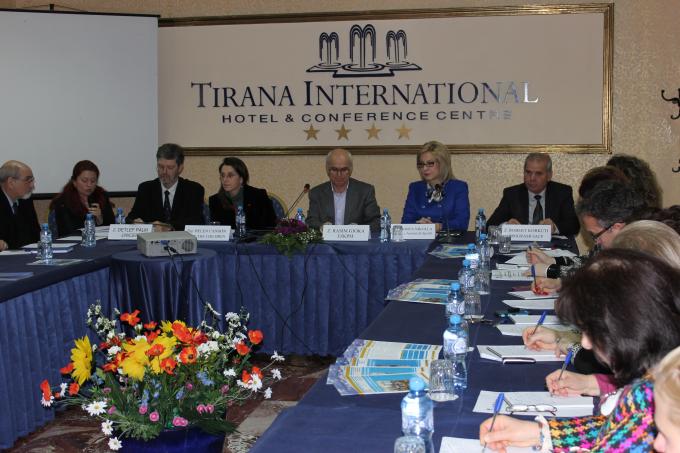Conflict resolution for children in schools through mediation and restorative dialogue
A round table was organized by Save the Children in partnership with Albanian Foundation for Conflict Resolution (AFCR), in collaboration with the Ministry of Education, UNICEF, and Swedish Assistance for Policy in Community (SACP) on January 29, 2013. The round table discussions emphasized that providing tools and skills for children, teachers, parents and professionals on how to prevent and resolve conflicts can lead to a reduction of violence and promotion of a safer school environment. Effective conflict resolution strategies and models involving schools and community are vitally important to ensure progress in this area. These were the main messages flagged by the participants in the round table ranging from the Minister of Education, Save the Children, UNICEF, SACP, AFCR, to teachers, education specialits, and psychologists from Tirana and Elbasan involved in a conflict resolution program through mediation and restorative dialogue.
The participants discussed about the prevention of conflicts through provision of mediation and conflicts resolution education and training for children in schools. The main aim of this activity was to promote development of an inclusive strategy, endorsing prevention and promoting effective strategies to reduce conflict and violence in schools and contributing to create safer school environments for children and communities.
"It is true that school violence is present, but action plans with line ministries are under implementation. It is important to put emphasis on collaboration and inclusion to facilitate and orient new responsibilities which aim to produce a strategic partnership. I am convinced that the partnership parent-teacher-student-community and government will provide a new communication and will engage all school stakeholders in solving this problem. as the more projects and such activities are organized the more they will enhance the work of the partners and the commitment of all stakeholders to reduce violence and conflicts in schools" said Minister of Education Mrs Lindita Nikolla during her speech.
According to data and surveys in Albanian schools, conflicts among children in school environments are increasing. In many cases, extreme forms of conflicts including violence and crime are increasingly evident. According to statistics from the Ministry of Justice, during 2012: the number of 14-18 year old juveniles in contact with law and convicted by the justice system was about 800, while in 2011 the number of juvenile prisoners was around 656.AFCR analysis of surveys and observations made in the primary and secondary schools of Tirana, during the second quarter of 2013, showed that the rate of conflicts has been increasing from 6% to 8% compared with previous years.The most recent survey conducted nationally by the State Inspectorate of Education, published in January 2014, showed that students now feel less safe in school settings. From 1435 students surveyed, 28% of them said they have conflicts with other students and about 42% of respondents said they did not feel safe in school settings.
During the round table, Save the Children called to authorities to incorporate conflict resolution strategies and approaches in the school curricula and to give children appropriate tools to deal with conflicts.
“Legislation is an important part of reducing violence and conflicts in schools, communities and families. But most important is not just to ban violence in schools, but to provide children with tools and understanding on how to reduce violence and strategies to avoid conflicts within school settings. Save the Children and AFCR’s work has been successful in a number of schools, empowering children to create safer school environments and building crucial life skills. It is important that these approaches are institutionalised by the Ministry of Education incorporating mediation and conflict resolution teaching into national school curricula; complementing academic learning with skills which will help these young people contribute to a democratic and safer future society” said Helen I’Anson, Save the Children Country Director during her speech.
“Conflict resolution skills should be a fundamental part of schools' curriculum and management style. Work experience and positive models show that the more conflict resolution techniques permeate the atmosphere and curriculum in schools, the greater the decrease in violence and enhancement of students' social and emotional development” said Rasim Gjoka AFCR Director. Since 2013, AFCR has been implementing conflict mediation and restorative justice component for children in 16 schools of Tirana, as part of “Strengthening Juvenile Justice System” program supported by Save the Children. AFCRis a local NGO created in 1995 which contributes to the democratization of Albanian society through mediation and conflict resolution education, aiming to influence the youth and other social groups of society, in promoting the values of education and understanding, constructive conflict management, mediation and conciliation tolerance.
The round table received extensive media coverage and active involvement of media representatives in discussions highlighted the importance of involving all actors in society, including the media, to contribute to reducing the situation of violence and conflicts among children in schools and communities.
 Albania
Albania 